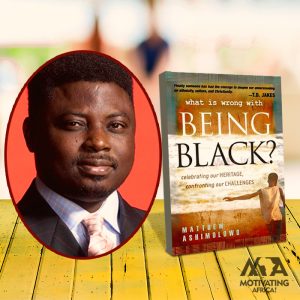What is wrong with being black? By Matthew Ashimolowo
Celebrating our Heritage, Confronting our Challenges
Overview
When you look around you, you could only wonder, “Has it come to this?” Should we begin to think that black people have a peculiarity with problems? In truth, an examination of the lives of black people around the world should answer this bugging question. Even though all human communities; black, white, green or red, are faced with challenges, Matthew Ashimolowo was not being out of place when he asked: “What is wrong with Being Black?”
This book is divided into two parts, the first part examines the glorious past of the man of colour while the second part analyses the problems that have been peculiar to black people and the causes of such problems. Matthew Ashimolowo tagged the second part “Conformations and Pathologies”.
It is a shame that the glorious past of the black man is not often told of. Matthew Ashimolowo has done an extensive research which reflects in the end product; as a matter of fact, the author must have been fascinated by the findings of his research.
Who knew that the black man was once revered, with Homer the Greek being said to have “placed blacks at a level as being as blameless as the gods”. In another place, the author speaks of Herodotus the Historian as the first European to comment on the physical appearance of Blacks and he described them as “the most handsome of men”, such was the glorious past of the black man. Many years later another European philosopher, Emmanuel Kant made the statement “The Negros of Africa have received from nature no intelligence that rises above the foolish”. Unfortunately, we have heard more statements of the like of Emmanuel Kant’s than we have heard of Homer and Herodotus, Chimamanda Adichie calls such a phenomenon, “The Danger of a Single Story”.
In the past years, the state of the Black person globally has become paramount and it has been observed that wherever Black people are, whether it is Australia – among the Aborigines, Africa, Europe, Latin America, the Caribbean, or North America, we seem to belong at the bottom of the pile, or the bottom of the pyramid, economically, socially, physically, mentally, etc. It makes one ask several questions:
Why do we seem to fail even where we are in the majority?
What is responsible for these 2,000 years of “Black backwardness”?
Have Blacks always been this way?
Why is there such a gap between White dominated and Black dominated nations?
Is the Black man victimized; and is he a victim of his own circumstances, pathologies, or of other people’s opinions and decisions?
Matthew Ashimolowo obviously did not write this book in order to add his voice to the blame-trading over who and who is not responsible for the black man’s problems, the white man or black man himself. When you read deeper into this book, you will understand Ashimolowo’s idea of superstition as a limitation of black people. According to him, superstitions are not limited to black people “but are in the majority very influential in the decision-making process within their communities”. Africans seem to term everything as spiritual and beyond human comprehension. This has had far-reaching consequences on the extent of research and development in Africa. It explains why the white man was the one who identified Africa as a continent packed with wealth. He saw our dense forests as a resource packed, Africans saw the forests as habitations of spirits. The white man saw wealth beneath our grounds, we saw our grounds as sacred and if we thought anything was beneath them, it was that deities lived there.
Another idea well examined by the author and to which we have to pay more close attention is the faulted educational system of black people. This book reveals that education is a problem of people of colour, the world over. In the United States, the author says African American youngsters increasingly hate schooling, partly because it is considered “acting white”. So, taking education nonchalantly there seems to be an act of defiance to prove that they are no longer under white control. The author also indicates that black education is a problem in the United Kingdom.
This point sighted by Ashimolowo stems from the fact that Europeans educated Africans in the early days so as to make workers out of them. They needed Africans to serve in various administrative and domestic capacities of the colonial government. The new colonial government workers usually lived better than many of their local contemporaries. As a result, there was a desire in every parent to educate his child so that they can get the clerical positions in the colonial establishments. Unfortunately, that impression has lingered. Little attention is paid to innovation and creativity.
We have graduates of Electric Engineering who cannot fix the smallest electrical gadget.
Matthew Ashimolowo also identified Leadership Crisis as one of the black man’s impediments. Dictatorial leadership is still an issue in many African countries. Where the leaders are not only dictatorial and self-imposing, they are also corrupt and insensitive to the plights of the people they lead. They make what Obiageli Ezekwesili once called “Tragic Choices”. The worrisome part for the author is that bad leadership seems to be something the man of colour has become conformed to. It seems like his peculiarity.
Matthew Ashimolowo’s book is a must read for everyone who is serious about addressing Africa’s long-standing problems. It helps us to look at where we slipped so as to prevent another fall. He exposes the lingering effects of colonialism, slavery, and segregation on the self-esteem and general living of people of colour, be it in North America, Europe, the Caribbean or Africa.
After reading Ashimolowo’s “What is wrong with being Black?” one would realize that history is like a tide. It rises and falls. But unlike the oceanic tide, it is not produced by the attraction of the Moon and the Sun; it is the result of the actions and inactions of people. We, every person of colour can arise and seize the tide of our lives. We can change things.
As Matthew Ashimolowo concluded, “There is nothing wrong with being black”
About the author
Matthew Ashimolowo is a Nigerian clergyman, the Senior Pastor of Kingsway International Christian Centre (KICC) in London and author of quite a number of inspirational books. He subscribes to and teaches success in the vein of Prosperity theology, which in most respects is considered controversial.





4 comments